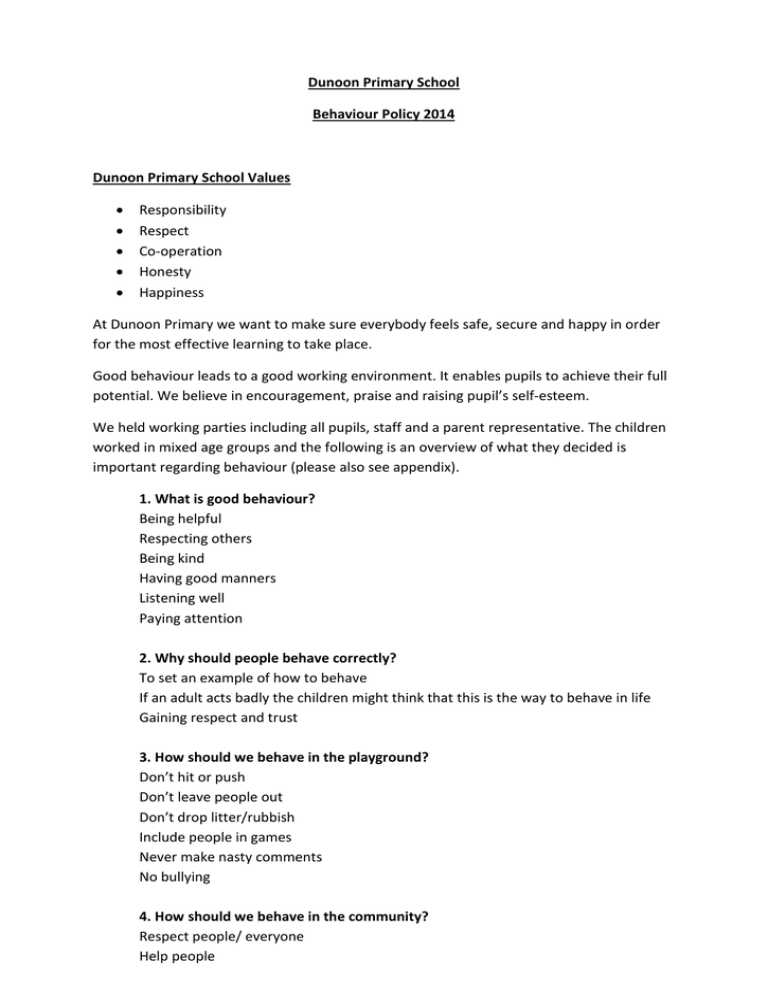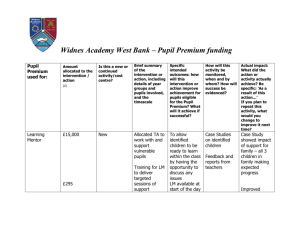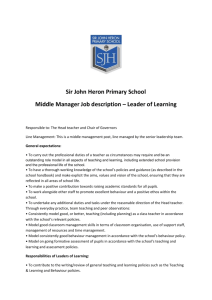Behaviour Policy - Dunoon Primary School
advertisement

Dunoon Primary School Behaviour Policy 2014 Dunoon Primary School Values Responsibility Respect Co-operation Honesty Happiness At Dunoon Primary we want to make sure everybody feels safe, secure and happy in order for the most effective learning to take place. Good behaviour leads to a good working environment. It enables pupils to achieve their full potential. We believe in encouragement, praise and raising pupil’s self-esteem. We held working parties including all pupils, staff and a parent representative. The children worked in mixed age groups and the following is an overview of what they decided is important regarding behaviour (please also see appendix). 1. What is good behaviour? Being helpful Respecting others Being kind Having good manners Listening well Paying attention 2. Why should people behave correctly? To set an example of how to behave If an adult acts badly the children might think that this is the way to behave in life Gaining respect and trust 3. How should we behave in the playground? Don’t hit or push Don’t leave people out Don’t drop litter/rubbish Include people in games Never make nasty comments No bullying 4. How should we behave in the community? Respect people/ everyone Help people Don’t fight Act sensibly, not messing around Don’t vandalise 5. How should we behave in the classroom? Listen when teacher or someone else is talking Don’t run about No interrupting/ shouting out Help people when they need you Respect each other Do as you are told by adults Being quiet when told Be kind Aim We aim to promote positive behaviour at school, at home and in our local community. Our Rules 1. 2. 3. 4. 5. Always be polite to others and show good manners. Be respectful of each other’s feelings, beliefs and property. Be kind to others. Take responsibility for your own actions. Have a positive attitude to learning and try your very best at all times. As a school we will discuss these rules with pupils regularly to ensure all pupils know what is expected in our school. The rules will be displayed in each classroom. Rewards Pupils will receive a star for behaving above and beyond expectation. Examples of this include: Good behaviour during each day (pupil has stayed on the white card). Good effort (including homework). Good citizenship. Being helpful/ doing a good deed. One bonus ‘star of the day’ will be given at the end of the day in each class. Stars can be given by any member of staff in the school. Pupils will be awarded a special badge in our achievement assembly for the following stars 50 stars- Bronze 100 stars- Silver 200 stars- Gold Individual teachers and other staff throughout the school community will also provide rewards, these may include stickers, certificates etc.as they know their pupils well and know what will motivate them. Each week star points will be collated (on a Thursday lunch time) and put towards Clan points. These points will be announced weekly in assembly to see which Clan has the most points each week, the winning Clan will, on one day during the week, be awarded an extra 5 minutes break time . However, if a pupil of the winning Clan has been on the blue card more than once during the week, that pupil will not receive the extra 5 minutes break time. Sanctions Each class will have a coloured reward system displayed in their classroom as follows White- You’re doing alright!! (1 large rectangle with pupils names on) Blue- Just won’t do! (3 smaller rectangles and pupils name card moves along for each warning). After 3 warnings the pupil will have a time out in their partner class for a period of 10-30 minutes with work set by their class teacher. Partner classes (P7 and P4, P6 and P3, P6/5 and P2, P5 and P2/1 and P1). If pupils return to class and have another warning they will move straight to the Red card. At the end of a day if pupils are on the first blue card and have been well behaved for the rest of the day they can be moved back onto the white card. Red- Straight to the head! Parents will be phoned and a meeting arranged to discuss the behaviour and action to be taken. This may include missed break/lunch or being excluded from activities or school. A record will be kept by class teachers of pupils who are moved onto the blue or red cards. If pupils have their name on any blue card for 3 or more days in a week, school will discuss behaviour issues with pupils and parents. Red Card Offences Bullying Swearing Racism Damage to property Violence/ hurting another pupil







